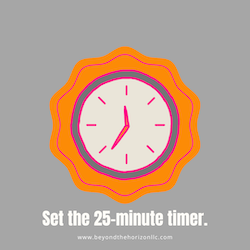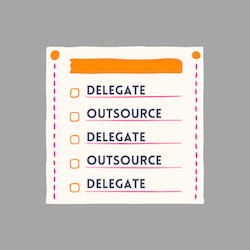Mastering Time When Life's a Circus: Tips to Stay Sane & Make Time for the Fun Stuff
Ever say, “I never have time,” “There’s not enough time in the day,” or “I’m always so busy”? Oh yeah, I’ve been there, still there sometimes! Here’s the funny thing about time—it’s one of the few things we can actually control. When we break down our priorities, we find we can make time for what really matters to us. Think about it. Even when your time feels “managed” by work or responsibilities, there are strategies to make it work for you.
With the holiday mayhem coming up, our plates get a little fuller—festivities, school events, festivals, parties. And while we want to be joyful, “Tis’ the Season” can quickly become “Stress in Full Swing.” So, here are some time management tips to help you actually enjoy the season without the burnout.
1. The Pomodoro Technique 🍅
I love the Pomodoro Technique because it’s like a game with little reward breaks. My personal rewards are those blissful 5-minute breaks and, of course, LUNCH (the best part of any day, am I right?).
What it is: Set a timer for 25 minutes (a “Pomodoro”) and focus on one task without interruption. After 25 minutes, take a 5-minute break. Complete four Pomodoros, and then take a longer break of 15–30 minutes.
Why it works: This method is amazing for focus, giving you bursts of productivity and reducing burnout. Plus, it helps you squeeze in time for productivity even when things get busy!
2. Set Boundaries 🚧
Setting boundaries is by far the most important, yet more difficult thing to do. Just the other day, I told a friend how setting work boundaries saves sanity. It’s a constant reminder that while I love my clients, I also love having a life outside of work. Our clients and colleagues don’t need 24/7 access to us, and if we set those boundaries, they’ll respect them (eventually, yes it takes time, but trust me it’s worth it!).
Why it matters: Overcommitting and saying “yes” to every invitation or task is tempting, but it can quickly drain your energy.
How to implement: Politely decline events that don’t align with your priorities. Remember, “No, thank you” is a full sentence! 😉 Embrace JOMO—the joy of missing out—and use that extra time for things that truly matter (hello, Christmas movie marathon!).
3. Prioritize with the Eisenhower Matrix 🔄
Confession: I used to be a serial doom-scroller first thing in the morning. Now? Social media can wait until my priorities are handled. For work, I stick to client calls and resumes from Monday through Wednesday, reserving Thursday and Friday for admin tasks. My mornings? Walking pad, emails, a quick LinkedIn check, and a little side hustle time.
What it is: The Eisenhower Matrix organizes tasks into four categories—urgent and important, important but not urgent, urgent but not important, and neither.
How to use it: Each morning, put tasks into these categories and start with what’s urgent and important. By focusing on the essentials, you’ll find more time for what matters most (and avoid getting sidetracked by random “urgent” emails).
4. Delegate and Share the Load 👥
Wish I had a whole team to delegate to—any volunteers? 😅 But seriously, delegating when possible is a game-changer. If you have support, trust them with responsibilities. Let family members help too; everyone can pitch in, even if it’s not your “way.” (I promise, that dishwasher can survive a little creative loading.)
Why this matters: You don’t have to be a superhero! Sharing responsibilities—holiday prep, household tasks, you name it—gives you time to recharge.
Pro tip: Trust others to handle things (no micromanaging). Sharing the load makes life easier and lets everyone feel like they’re part of the team.
5. Schedule Downtime 🧘♀️
Self-care matters, especially during the hustle and bustle. If you’re wondering how, check out my self-care blog post for more ideas.
Why it’s important: Regular downtime helps recharge your batteries. You’ll come back to tasks with a clear mind and avoid burnout.
How to implement: Pencil in “me-time” just like any other event. Whether it’s a 10-minute walk, meditation, or even an uninterrupted meal (especially this - don’t skip meals or snacks), scheduling breaks is super important for your mental health.
6. Reflect and Adjust Weekly 🔄
I take a few minutes every Friday to assess the week. What worked? What didn’t? If there’s something to adjust, I jot it down.
How it helps: Weekly reflections keep your goals on track and allow you to re-prioritize. Adjusting as you go means you’re always aiming for maximum productivity and satisfaction.
Challenge! Try one of these strategies this week and see how it affects your time. Which one sounds like a winner? Let me know in the comments, or tag me on social if you’re putting these tips into practice!
Want more support?
📖 Grab a copy of my book Get It Together (Without Losing Your Mind)—it’s full of stories and strategies to help you reclaim your time, energy, and purpose.
📬 And don’t miss the weekly Fuel Your Week newsletter, where I share real-life tools and coaching tips you won’t find on social media.
👉🏼 Buy the book - Subscribe to the Newsletter - or fuel me with some cafecito
Disclaimer:
I am not a doctor, psychologist, or licensed therapist. Everything I share is based on my personal experiences and should not be considered professional advice. For personalized guidance, always consult a licensed medical or mental health professional—yes, a real one, not "Dr. Google" or the comment section of social media.
If you're in crisis, please call 911 or contact the 988 Lifeline for immediate support. You're not alone, and real help is available.





